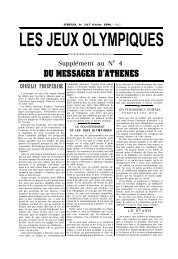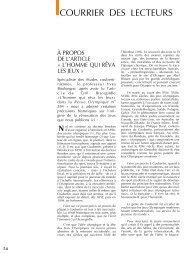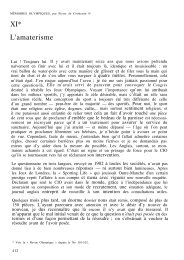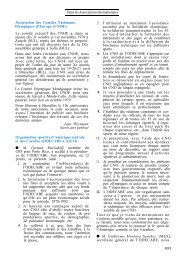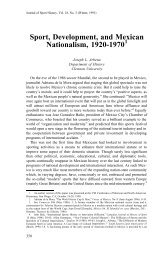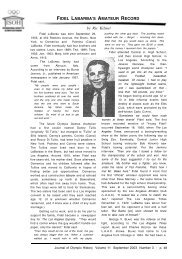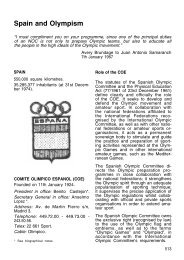Sport and Colonialism in 19th Century Australasia - LA84 Foundation
Sport and Colonialism in 19th Century Australasia - LA84 Foundation
Sport and Colonialism in 19th Century Australasia - LA84 Foundation
You also want an ePaper? Increase the reach of your titles
YUMPU automatically turns print PDFs into web optimized ePapers that Google loves.
For the gentry, gambl<strong>in</strong>g was typically a means of display,<br />
<strong>in</strong> which they could show their wealth <strong>and</strong> their contempt for<br />
mere money, rather than a means of <strong>in</strong>creas<strong>in</strong>g that wealth. For<br />
them, los<strong>in</strong>g large stakes was just as important as w<strong>in</strong>n<strong>in</strong>g. They<br />
were not concerned with try<strong>in</strong>g to achieve good odds. An evenmoney<br />
bet had greater attraction than the possibility of w<strong>in</strong>n<strong>in</strong>g<br />
a large sum for a small <strong>in</strong>vestment. 16<br />
For the poorer classes however, a w<strong>in</strong> offered the opportunity<br />
to achieve th<strong>in</strong>gs which were normally beyond their means.<br />
The man who won at "throw<strong>in</strong>g at cocks" could assume, for awhile,<br />
the role of entrepreneur. One who won a prize <strong>in</strong> a lottery<br />
could present his sweetheart with a tr<strong>in</strong>ket. For most of the<br />
labour<strong>in</strong>g classes <strong>in</strong>come was irregular <strong>and</strong> sav<strong>in</strong>gs were virtually<br />
unheard of, apart from the money put aside for burial expenses.<br />
So for them, gambl<strong>in</strong>g provided a unique opportunity<br />
<strong>and</strong> naturally they were attracted to those forms which offered<br />
the possibility of a large prize <strong>in</strong> return for a small outlay. 17<br />
The history of British lotteries illustrates this difference<br />
<strong>in</strong> attitude. When Engl<strong>and</strong>'s first national lottery was<br />
held between 1567 <strong>and</strong> 1569, 100,000 tickets were offered at ten<br />
shill<strong>in</strong>gs each for a £5,000 first prize. The tickets were too<br />
expensive for all but the wealthy, <strong>and</strong> that group showed little<br />
<strong>in</strong>terest <strong>in</strong> this type of gambl<strong>in</strong>g. Less than 10 per cent of the<br />
tickets were sold <strong>and</strong> prizes were reduced accord<strong>in</strong>gly. As a<br />
fund-rais<strong>in</strong>g exercise this lottery was a failure. It did, how-<br />
ever, provide <strong>in</strong>spiration for numerous less ambitious <strong>and</strong> consequently<br />
less expensive lotteries which followed. Small scale<br />
lotteries, sometimes state-run but more frequently private<br />
lotteries used as a means of sell<strong>in</strong>g goods at prov<strong>in</strong>cial fairs,<br />
achieved such enormous support from the poorer classes that<br />
legislative attempts were made <strong>in</strong> 1669 <strong>and</strong> 1710 to restrict<br />
their growth. These attempts failed <strong>and</strong> "little-goes" cont<strong>in</strong>ued<br />
to attract greater support; to the po<strong>in</strong>t where a parliamentary<br />
enquiry <strong>in</strong> 1808 recommended their prohibition. 18<br />
Although the wealthy <strong>and</strong> the poorer classes were attracted<br />
to different forms of gambl<strong>in</strong>g, or were motivated by different<br />
desires, they were mutually <strong>in</strong>terdependent. In particular, the<br />
major bett<strong>in</strong>g outlets provided occasions for class co-operation.<br />
9



